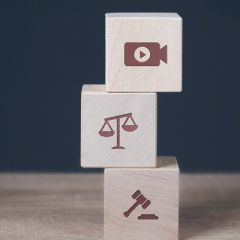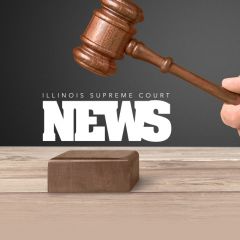The Attorney Registration & Disciplinary Commission (ARDC) of the Supreme Court of Illinois, the entity that investigates and prosecutes attorney misconduct, recognizes its responsibility to work towards making sure that the legal system functions fairly for all citizens. To that end, the ARDC has formed the Equal Justice Rules Committee (EJRC) to examine the ethical rules that govern Illinois attorneys’ conduct with the goal of determining whether amendment of those rules is necessary to enhance attorneys’ rights and refocus attorneys’ duties to act in a manner that supports the equal and fair application of justice.
Practice News
-
August 10, 2020 |
Practice News
2 comments (Most recent August 13, 2020)
-
August 10, 2020 | Practice News

It is no secret that some defendants will go to great lengths to avoid being served. Some defendants are even willing to lie about having been served. As a result, the law on this issue has developed firmly in favor of plaintiffs. In the context of personal service, return of service is prima facie proof of proper service and courts are required to indulge in every reasonable presumption in favor of the return. But what happens when an officer has actually, and unrepentantly, served the wrong person? In his August Illinois Bar Journal article, “You Got the Wrong Guy,” Jake Crabbs prepares attorneys for the uphill battle ahead when they set out to prove a case of mistaken identity when the courts are disinclined to believe your client is telling the truth.
-
July 31, 2020 | Practice News

In its August 2020 cover article, “Remote Reality,” the Illinois Bar Journal speaks with attorneys, judges, and court administrators throughout Illinois to report their experiences with holding court hearings and business remotely. According to several legal professionals interviewed, some form of remote court access is likely to stay in place or expand even after the COVID-19 pandemic has run its course. Meanwhile, courts in Illinois continue to experiment with and learn from their efforts as they figure out what has been working well and what hasn’t.
-
July 27, 2020 | Practice News

The term “independent contractor” has historically been defined as “one who renders service in the course of an occupation representing the will of the person for whom the work is done only as to the result of the work and not as to the means by which it is accomplished, and is one who undertakes to produce a given result without being in any way controlled as to the method by which he attains that result.” But the label “independent contractor” does not absolve a hiring entity from tort liability for the latter’s own negligence when retaining some requisite degree of control over an independent contractor; nor is the label dispositive for determining whether an agency relationship existed between the two parties. As Gregory Jones shows in his July Illinois Bar Journal article, “Will the Real Independent Contractor Please Stand Up?”, causes of action against employers of independent contractors remain viable in certain instances. Jones also examines claims against independent contractors and various tests for vicarious liability.
-
July 23, 2020 | Practice News

The Illinois Supreme Court announced today that due to continuing public health concerns raised by the COVID-19 pandemic, the Illinois in-person bar examination scheduled for September 9-10, 2020, has been canceled. In its place, the Illinois Board of Admissions to the Bar will offer a remote version of the exam on October 5-6, 2020, using questions prepared by the National Conference of Bar Examiners. This exam will satisfy the requirements of Illinois Supreme Court Rules 701 and 704.
-
July 20, 2020 | Practice News

When a lawyer relocates to a new firm, timing and content are important when determining ethical responsibilities and what information may be shared with clients, colleagues, and the new and old firm. In their July 2020 Illinois Bar Journal article, “When Lawyers Relocate,” attorneys Michael Shakman and Diane Klotnia examine various opinions written by the Illinois State Bar Association and the American Bar Association as well as rules of professional conduct that provide guidance on avoiding conflicts of interest for the relocating lawyer and his or her old and new firms. Illinois lawyers especially face subtle differences in professional conduct rules regarding relocating, Shakman and Klotnia note. And, in certain relocation-based matters, state caselaw is not settled.
-
July 17, 2020 | Practice News

The Illinois Supreme Court announced today the amendment of Rule 7.3, which pertains to the solicitation of clients.
The Rule was amended to prohibit all client solicitations that "seek[] representation of the respondent in a case brought under any law providing for an ex parte protective order for personal protection when the solicitation is made prior to the respondent having been served with the order."
-
July 17, 2020 | Practice News

Chief Justice Anne M. Burke and the Illinois Supreme Court announced today the approval of new Rule 139 regarding practice and procedure in eviction proceedings. The new rule requires an eviction complaint to include a copy of the written eviction notice or demand and, where applicable, the relevant portions of the lease. The new rule is effective immediately.
-
July 16, 2020 |
Practice News
The U.S. Attorney's Office Central District of Illinois is accepting applications for an assistant United States attorney opening in its Criminal Division to be located in Springfield or Urbana.
Applicants must be United States citizens or nationals; submit to a background investigation, credit and tax checks, and drug test; be registered for selective service, if applicable; and have a J.D. degree and active member of the bar (any U.S. jurisdiction).
-
July 15, 2020 |
Practice News
The Illinois Attorney Registration and Disciplinary Commission (ARDC) is hosting an online town hall event from 11 a.m. until noon on Monday, July 20, to discuss its Intermediary Connecting Services Proposal.
The proposal, which was published in February, is aimed to increase opportunities for lawyers to connect with clients and market their services to the Illinois public, while also fashioning a regulatory framework for connecting services.

